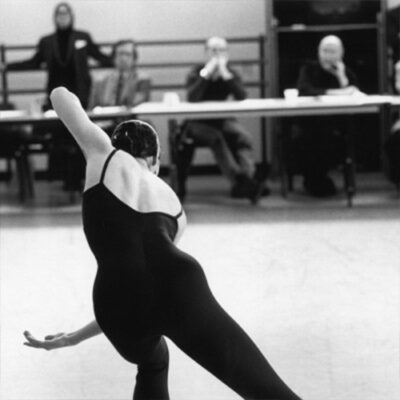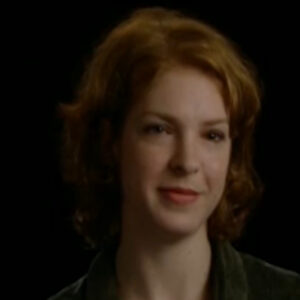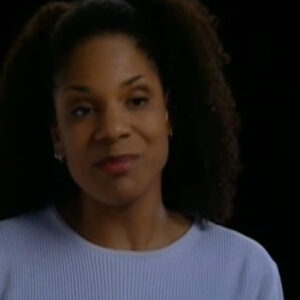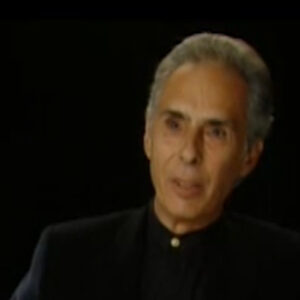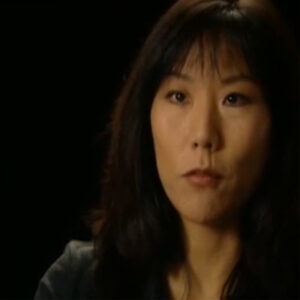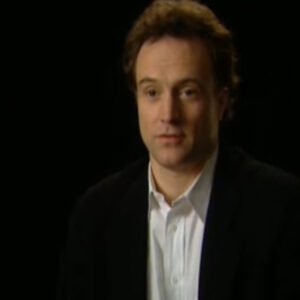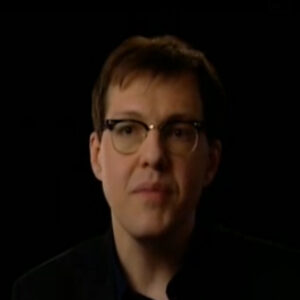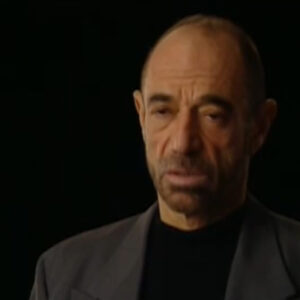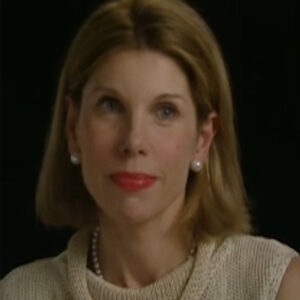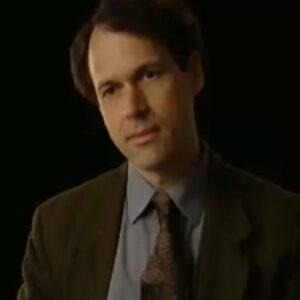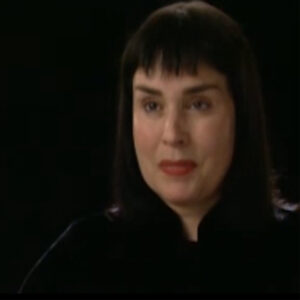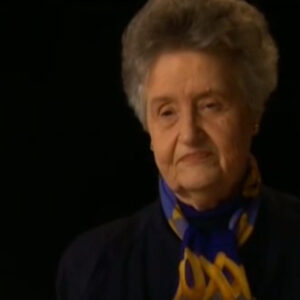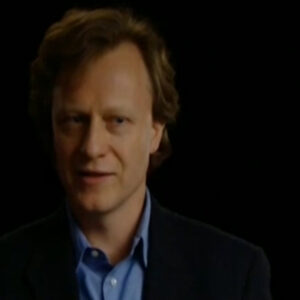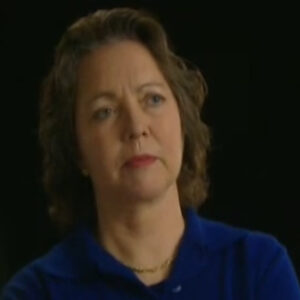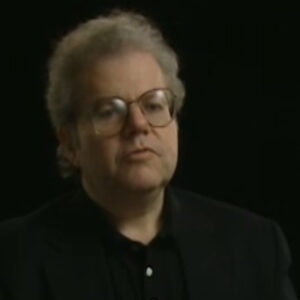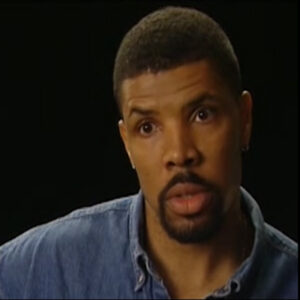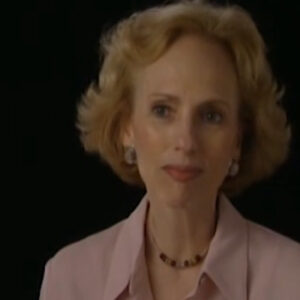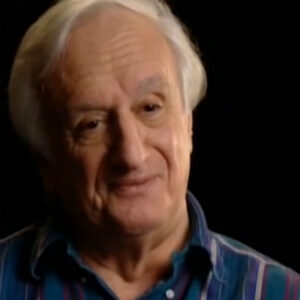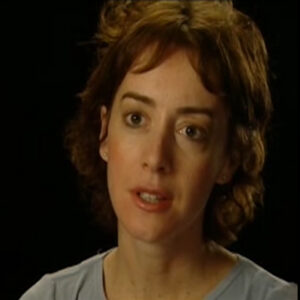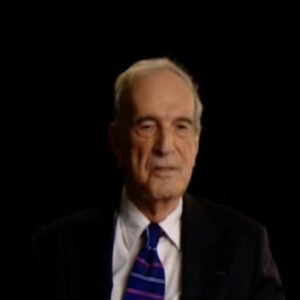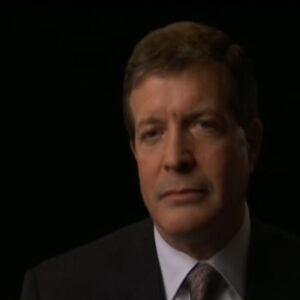Speaker Robin and Chris came as advanced students, whatever they were called. They joined in the third year. Chris stayed in my class. Robin dropped back to become a freshman. That’s where all of technical training was. Was it was in years one and two. Well, that model lot of us stuff.
Speaker Oh, Mommy. Me, mama, mom. Mama.
Speaker Yeah, well. You know, well, a program is, of course, being a director. You actually went through. Talk to me a little bit about me. Why did you end up at Juilliard? What was it like?
Speaker I went to Julia because I couldn’t get into Yale or Carnegie Tech. I mean, it was just simple. And I think in July or something, I was telling a teacher of mine, because I have gone through four years of college that I had no idea what I was going to do and he should go to Juilliard. I patiently explained that it was a music school and he patiently explained that I was an idiot. And there was a drama program. And I just what I think I just walked in and actually they were on 60 Fifth Street by that point and they said, Who are you? And I said, I’m a director. And I come to your program. And they said, come back in two weeks and audition as an actor. And if you can sort of not hold the class back too horribly, we’ll let you direct on your own. So that’s what I did. It was very generous of Jon Huntsman and Marco Harley.
Speaker Why? Why being a director, did you want to go through that? What was the.
Speaker I was I was in the acting part was just this was fun, first of all, because acting’s great fun, even if you’re bad at it as I am.
Speaker But it was great to be around all those kids. I mean, it was Juilliard at that time. I quickly learned it was a very hot place to be. I don’t mean in the 90s sense of that in the PRB sounds. I mean that there was heat there, that there was excitement there, and that this faculty, which seemed old. But I realize now they must have all been in their 30s, basically, except for John had enormous passion and enormous enthusiasm.
Speaker And that was just terribly appealing to me. Also, being in New York was very appealing and ultimately better than being in New Haven.
Speaker And, you know, I did have to come back and audition and I auditioned really horribly and they were kind enough to not laugh. It sounds like I’m being falsely modest, but I I’m not. I mean, it was truly atrocious. But it seemed to be OK.
Speaker I think they were intrigued at the idea of taking a director. And I was the only one who was offering himself up. So it was their little experiment and mine. And as I say, they were just very generous.
Speaker What were your impressions of that time you got there, you were.
Speaker Well, when my group arrived, John wasn’t a movie star yet. He was the legendary producer of Orson Welles and of all of those important movies. And we all had some idea of what had happened at The Mercury, although many of the books that have been written in. Well, obviously, none of the books that have been written in the last twenty five years existed then. So it was it was a sort of general knowledge that we had about the 30s and not sure John had written his first book yet. I don’t think run-Through had been published. So we just knew that he was a famous and distinguished man. And then we just had this sense that we were clicking in to American theater history. And that’s something that’s always been interesting to me. I’d love working with people of previous generations. You know, anyone my age knows people who knew Stanislavski. That’s how short the modern theater and you know, the first director, the first modern director is. One hundred and fifteen years ago, Stanislavski worked well into this century. So that was incredible to know people who knew Stanislavski and to see every day a man who had produced plays with Orson Welles. It was invigorating and it was inspiring.
Speaker And it made you want to do better work and. I don’t know that it ever made me feel privileged in any sense. It just made me it made me want to work harder.
Speaker Julia was a very disciplined place. And although I went there in 71, it was still the feeling of the 1960s. And I had come from a world where you didn’t have to go to classes at all. You just if you could pass your exams, you were fine. So to go where you just. There was no such thing as skipping a class with joy at you. First class of your first class was at eight thirty. You worked until six, 30 or seven, 30 at night. In my case, I then convinced my classmates to stay and rehearse until 10 30 at night and bribed the janitors with Thunderbird wine to keep the rehearsal rooms open. You know, we spend 50 dollars on props and do our little shows in the rehearsal rooms. And I loved that. And I it reminded me of the discipline of music, which I’d been doing before going to the practice from all my teenage years. I went to a practice room at seven thirty. So so it was great to be back.
Speaker And that kind of work, work, work environment.
Speaker And with John, we were the.
Speaker You know, very interested in coming and supported them coming to see the very beginning, where you may be acknowledged as a director with a sort of like pay your dues.
Speaker Yeah, well, you know, I would say all of the faculty were very supportive of what I wanted to do as a director. And some I you know, I would say to my classmates, you know, just because we’re here to eleven thirty at night doesn’t mean that you can skip class in the morning because they’ll shut this show down. I’m sure they would come and see them and they would send me off to meet people and little symposia around town and tell me about. And they were just incredibly great about it.
Speaker And what was, what was the relationship like? I mean, we’ve talked to some degree that Julie Archer runs in these groups. And you say for me this. Squadron with your.
Speaker Yes, I do. To the best of my knowledge, it’s a unique way of doing it, that there’s no mingling between what most people would call the freshman software engineer, senior classes. And yes, there are favored groups and less favorite groups. The legendary group one, we’re seniors. When I was a freshman and they really got huge, huge, huge percentage of the attention from the faculty. They were about to form a company. They were being reviewed in The New York Times. They were a dazzlingly talented group of people thrown together by fate. And we were all very jealous of Group one. I mean, we hated how much attention Group one got and where we groused about it constantly.
Speaker And it was sibling rivalry.
Speaker And one group, two and three.
Speaker Well, up to two. There’s like there’s no one you’ve ever seen in group to really, really suffer.
Speaker That was a that was a tough. That was a tough group to be a part of. Although Christine Baranski may have been a group to a peer group. Three.
Speaker Yeah. Yeah.
Speaker Yeah. And she’s a group three. Yeah. Group through a two fer. God have mercy on their souls. I mean, that that was just that was a tough road to hoe. But no, you I mean, you got your money’s worth. And then then John did become a movie star. And my group fell apart. There were forty one of us to begin with. And then it was down to 16. By our third year. And then seven of us quit in one week. So nine people out of 41 graduated from my class. I was not among them. I was part of the seven rather magnificent seven who departed one week. And I went upstairs and told John, I suppose on behalf of my class, I can’t remember whether they asked me to speak on their behalf or not. But I did go up and. And I said, you can’t go to Europe to promote the paper Paperchase. Everybody going to drop out? You can’t do that. And he said, well, I will be doing that. And I hope you’re all here when I get back.
Speaker And of course, we were.
Speaker Now are about 40 different things that come to my mind from that.
Speaker But in.
Speaker Let let’s let’s go back to the training of.
Speaker Two years.
Speaker I mean, what? Talk a bit about that training, about some of the faculty, about, you know, there were so many interesting faculty members there from from people who were still there. Now, Mona, you came here to not there. Now he’s retired. But I’ve talked to him. What? What were your sort of memories of the of those classes? Not that of classical training.
Speaker Well, they took the the technical training was beyond anything any of us had ever imagined before. Edith Skinner, the greatest speech teacher, and she’s meant to be suddenly self-conscious about my speech. But certainly the greatest speech teacher at American theatrical history and the writer of the definitive book on American speech was there. I mean, it was Edith. It wasn’t some protegé aviator’s. It was either. And she would, you know, for the first four months, you you. You don’t do anything but learn how to say vowels. And that doesn’t include diphthongs. You know, it’s just you learn.
Speaker Ah, you know. Yeah.
Speaker You know, you don’t learn a because that’s defined. So that doesn’t come until the sixth month. And the idea, of course, is to give you not only a speech where a group of actors can all sound as if they’re in the same universe but to to energize it. But you go through this horrible period where you are beyond self-conscious about it and sound like some horrible cross between, you know, David Frost and.
Speaker You know, Spike Jones or something. It’s just it’s impossible and a silly cois I.
Speaker British things like, you know, super or something rather than super an hour or two to her rather than to her. And it takes you forever to learn that it is to her and not to her. But it’s still soup and not soup, as you end up saying. Can I have the soup? You know, and all the upperclassmen burst out laughing. And but Edith said at the end of the first semester, you know, you’re going to go home now. You’re going to go home now class and you’re going to see your friends and you’re going to see your families. And they are going to make fun of the way you speak your good English sounds. Just remember, they don’t matter. They don’t matter. And if you have to choose between your friends and your good speech, I’m sure you’ll choose your good speech. So, you know, there’s very famous story about where you are. The song you in for his father. Father, you’ve said this thousands of times after a couple of months, father. And she was calling roll one day and she pointed out that this kid had actually missed class, the unheard of thing. He had missed three classes in a row. And she said, Charles, how are you going to learn your good speech sounds if you don’t come to class? And he said, geez, I don’t gosh, I’m sorry. If I would have thought somebody maybe would have told you this, but I was and I was in Denver because, you know, my father died. And he said, no, no, Charles, your father died. True story. And you just you know, you had the love that as well as being horrified by it. And then Monia Keem was doing stuff that wasn’t mine. I mean, Ronnie’s brilliant mind, but he wasn’t teaching his mind. He was teaching his movement and ways to use our bodies, some ways to breathe and way to be free. It was his fellow named Harvey Burgess who taught a circle circus skills. He never got to use circus skills in a play. I mean, once maybe in your life, Lou, I can juggle. Unless you’re joining up with Flying Karamazov Brothers. I said, Tom Harvey, why are we learning all this? It’s fun. It’s great. But why? And he said confidence. Every single one of you thinks that he or she can’t juggle or you can’t ride a unicycle. But in six weeks, you’ll be able to juggle and ride a unicycle at the same time. And that kind of courage, your ability to throw yourself into something is really important for an actor.
Speaker And that’s what I’m here to teach you. So that was great. It was just fun. What can I tell you? I mean, the work of it was fun.
Speaker Well, it was fun until forty one came down to nine. That’s those are those are drastic cuts.
Speaker I mean, in a way, how they talk about this ensemble feeling. But how are you really creating. How did how did these excessive cuts get? How is the feeling of it from other. I mean, amongst the group?
Speaker Well, you know, they had a lot of people out after the first year. And it’s hard because a kid who’s never gonna be good enough to be an actor can be just as close, if not closer friend, than someone who might have a career. So you resent having those relationships torn apart. But I think it’s smart. I think that it’s, you know, and it’s magic. The contrary would be true to continue to take someone’s a vast amount of money every year to train them for something that you correctly or incorrectly think that they’re never gonna do would be you know, it would be cheating. It would be wrong. And if the kid who gets tossed out of Juilliard wrongly, which is to say he or she is going to turn out to be a great actor, then getting kicked out of drama school isn’t going to stop them. They’ll find a way to be a wonderful actor and experience a lot more rejection than that in life as an actor. So the rejection shouldn’t be a factor. And if you’re truly talented, you’ll find a way to do it. A lot of the best kids left Chile.
Speaker Bill Hurt didn’t make it through Juilliard. Not that he was thrown out. But if you talk to him, I’m sure he’ll tell you the whole story.
Speaker Well, no, I mean, many, many, many people of the well-known.
Speaker After and especially the film actors did not go did not go through. Forty one to nine. I didn’t know until he was seven. People are quitting in one week. John has been promoted.
Speaker I don’t know. I it was just a you know, so I don’t want to focus on this too much. It just we were doing three or four plays at the time and enough people left so that those plays were recombined. And it was crazy and it was rebelliousness on our part as much as anything else.
Speaker So but my left, because my project fell apart. I was about to start directing. Choose Me. End game. And, you know, three of my four actors left. So I sort of have no reason to stay.
Speaker And tell me a little bit about the interaction of of the divisions at that time. When did you have.
Speaker What was the environment mean with dance music? Well, you would we we the divisions were separated physically by floor or by section of floor.
Speaker So the only time you would ever see them, the musicians or the dancers, would be in the cafeteria. And really, you didn’t see them all except for, you know, trying to seduce the ballerinas. You know, I mean, I don’t really remember any socializing or ever going to see a dance performance or any of them ever coming to see us act. We were all very much in our own worlds and may just be my imagination. I think you are young. I was a student there. Then that would make sense. And he was already kind of a star. There’s a huge difference, of course, because as a 19 or 20 year old actor, you’re just learning how to do it unless you’re some phenomenon like Jodie Foster. But a 19 year old musician is an extremely accomplished musician. If he or she is at Juilliard, so they’re hitting their stride and about ready to hit the concert stage in a big way are about ready to go join the orchestra or a chamber ensemble. So. This isn’t why, but we were very aware of how they were plowing through the most difficult parts of the repertory of their repertory with dazzling ability, and we were still there learning not to say soup, you know, and mom, a lot of us, we were really, in effect, playing scales and they were playing Beethoven.
Speaker Same with the dancers. 19 year old dancers, fairly accomplished person. So we felt like the dodo. So what I say, can we admired them for their confidence?
Speaker What you’re talking about is this incredible amount that was being placed on one group, one. Do you think that was partially. I mean, obviously they were very talented, so talented. He continued on with the company. So once they’ve gone from once they went off and they went into their as the acting company and did the environment of the school seedling.
Speaker Sure. Sure. When they I think when the when the when the group won kids the Kevin Patty.
Speaker David stires grew up, all went off and became part of the acting company. We, we felt I suppose even more, you know, bereft than we had when we were competing with them for mom and dad’s attention every day. At the same time, it was thrilling for us that they were out there doing this. This was in the early 70s. You have to remember the Ford Foundation’s only created in 1964. There probably weren’t more than 20 or 30 not for profit theaters in 1970. This thing now of hundreds and hundreds, if not for profit theaters didn’t exist. Broadway was still dominant in the American theater in the early 70s in terms of new play production, in terms of where the great actors worked. So it was a it was a very important transition time in the larger American theater. And we felt, you know, cut off from all of that. We were never invited to go see shows across the street at Lincoln Center Theater ever once. I take it back one dress rehearsal in three years. We were invited to. And so we we although we were in New York and we felt charged up by the by our own mutual energy and the energy of the faculty and John’s legendary status, we had really no connection to the real world. None, zero. And so the acting company kids became a sort of a bridge to the real world. Suddenly, our friends were getting paid to do checkoff and restoration play. And even the occasional new play. And that was that was thrilling. It was really thrilling. And we didn’t know whether we would get to be a part of that or not.
Speaker But. We knew they were special and we know that we might have a chance to be with them.
Speaker And even though you left voluntarily three years later, but then already had this kind of streamline from Juilliard to the acting company, was it already dwindling? I mean, now I feel it’s they never talk about the acting.
Speaker You know how long that I really.
Speaker I have no idea what the feeding system to the acting company is anymore.
Speaker I mean, even back then by your time. People’s are you going?
Speaker I don’t. I can’t remember if we wanted to go, except in a vague way, whether I can’t remember if we had any hope of going into the acting company, because I don’t think there were any available positions. Nobody was leaving it. There weren’t other theaters to go join. At the time, there just weren’t. And I don’t think it occurred to any of those kids. They would be.
Speaker Movie star or television star, television even probably occurred to Kevin. I don’t know. Who are you studying acting?
Speaker Michael Kahn was my main acting teacher, is still there.
Speaker So that’s I mean, Jared was teaching acting gene last year.
Speaker So let’s talk a little bit about like I mean, obviously in your own career now, you must cross paths with Michael on the school days. But talk. Tell me a little bit about Michael. And you still have the infamous third year acting class.
Speaker Is it from US school? Well, I mean, Laura Linney said essentially the whole the whole experience was worth the third year of Michael.
Speaker Wow. Really? I mean, not that I had a bad time.
Speaker It’s hard to see. I mean, when you’re not someone and, you know, I’m not an actress and I’ve been in this class many times. I’ve had many people say that to the naked eye. I feel almost like, do I not know what I’m looking at or are they all that they are? They dropped off.
Speaker Whether you say what you just said, you know, I’ve been in the class and you don’t see what is this greatness that they’re over for you or is it that it’s so drilled into you that it’s going to be great by the time you get there?
Speaker You’re saying, oh, my God. And Michael Cullen is the greatest acting teacher of all time. What is you know how I don’t I mean, I’m teaching I think it’s a mystery to me anyway. The whole idea of being taught to be I think I’m I’m from you know, I’m from the movie world.
Speaker Essentially, it’s a craft to acting and it’s teachable and it’s not a difficult craft to teach. It’s it’s just not it’s not a difficult craft to teach, and the hardest thing about acting is all the mystery that surrounds teaching. Acting is all the mystery surrounds it. Someone is the has, you know, received wisdom which he or she will pass along in some way.
Speaker And they’re gifted teachers as well as less gifted teachers in acting as well as music or computer skills or anything else.
Speaker Well, what was Michael like? I mean, was your. I mean, John House refers to him as having piles and goes. They didn’t appreciate that. You know, I’d like to reread the sections that refer to him as like the war better. But he was quite young.
Speaker He must have been very young. He must defend thirty thirty one, sixty eight.
Speaker He does not hardly think I will be one of those weird people. You have no idea. You must be anyway. Late fifties, probably. But what? So he was young. What. What was he like as a teacher?
Speaker Well, I always thought of Michael as a teacher and even more as a director.
Speaker Maybe that was my perspective on him as a as a as an aspiring director. But I know my memories of Michael are not so much memories of class, but things that he would just drop in the middle of class like he was going to the Bob Dylan concert that night when I said he kind of the bowed concert. And he said, well, yeah, aren’t you? That seemed kind of cool that your acting teacher would be kind of a Bob Dylan concert. And I remember the enormous passion of Michael directing school projects, or sometime during that period, he became the director of the Stratford, Connecticut Shakespeare Festival. And he was great. He would always have us out. And he watched a lot of rehearse. Not a lot. I watched rehearsals and that was interesting. And I remember how incredibly important it was to him. And that special effects hadn’t won. Hadn’t happened one night in a production just a little, you know, school production. I remember him storming into the stage manager’s office at the intermission and chest cream for this failed Technicolor fact.
Speaker And I remember thinking, boy, this is really important to him. I mean, this is really important. And I kind of at my heart that I mean, I felt sorry for the guys. And I’m sure that, you know, five years later, Michael was finding other ways of getting the effect to go off well the next night rather than yelling at everybody. But when you’re young, yelling is a big thing, you know?
Speaker Well, he certainly is. I mean, there are two people. He directed Duchess of Malfi last year. And I ran to the Juilliard bar.
Speaker And the bar you were telling went to my bar is torn down by the Juilliard bar that exists now.
Speaker Every second I go to hang there, you know, get the door and I’ll always get a credible bitterness from people that say a year or two years out. That’s that time when you just maybe can’t have your career and people will be feeling like a run until talk about being directed by Michael Rusal like Renfree experiences of their life. I can picture that. I mean, he’s interesting.
Speaker Michael’s an extraordinarily intelligent and talented man. And I’m sure of it students continue to have extremely complicated relationships with him and feelings about him. You know, this whole question of an acting school is a difficult question because it’s it’s worse than law school. It’s worse than the line from Houseman’s movie Paperchase. Look to your left. Look to your right. Forty years from now, one of you won’t be here.
Speaker He says to his freshman law class, because if you look to your left and your left and your left and your left and your right and you’re right, you’re right. And you’re right, they aren’t going to be there.
Speaker They may make it through school, but they’re not going to be working. And if it poses a curious dilemma for the schools, because how would you even know which for kids to choose? Even though only four kids are going to make it every year, you wouldn’t choose them. So you go through the process. You choose your 20 or however many kids enter these classes every year or the hundreds so that enter NYU or Columbia every year. And the faculty knows perfectly well that most of them won’t make it. And the kids know perfectly well that most of them won’t make it. And no one’s ever been able to solve this problem at partly what I was talking about before, which is you can’t tell how talented an 18 year old is. You can tell someone who’s blazingly talented. I remember stumbling into one of the rehearsal rooms late at night trying to find a place to do a scene. My partner one night and in there were frantic. Conroy and Bill hurt two of the great living American actors right now.
Speaker And and they were doing a scene from Ostrowski just on their own. I just I couldn’t breathe. That was so amazing.
Speaker And they were just 19. But that’s very rare. I mean, you knew you were seeing something legendary. You know, that Bill was going to be one of the great, great actors. And you know that Freddy was as well. And then it was very special. And Frank Rich never become a movie star, but a friend of Connery lived in England. She’d be dame for any con right by now.
Speaker She’s an extraordinarily gifted and beautiful and. Dedicated actress.
Speaker And if there were more work in the American theater, if there were more work on Broadway, we would see Friday every year and a new play. So that’s the other part of the problem, isn’t it? It’s the most the kids aren’t going to be good enough to even make it. And the kids for whom who who do have the skill and the talent. The American theater has evolved in such a way over the last 25 years that there’s very little work in New York City for them to to to to enjoy. And, you know, you say, well, and go to Chicago, but a dentist doesn’t have to go to Chicago to practice his craft. You know, you might move to Chicago, but you don’t say, oh, well, I’ll do eight weeks of dentistry in Chicago and then I’ll go to Cincinnati for eight weeks of dentistry. You set up a practice and really that doesn’t exist in the American theater now. And that’s one of the questions that people will have to ask. Twenty five years from now, why did the American not for profit theater movement and in some way Juilliard fit into that? Why did it not develop in such a way that actors, sublime actors, could make anything more than really just a scrape by minimum wage? Why should the greatest actors in America be working for nothing? Working for scale or just a little bit above it? Why is it feast or famine? Why is it Robin and Kevin and David stires going MASH?
Speaker I mean, God love them all. Or else, you know, working at a regional theater for eight hundred dollars a week. What is that about? What happened? Could Juilliard have made a difference? I don’t think so. And I certainly don’t mean that question in any way critically. But that’s the question everyone in the American theater has had to face. What happened? Why did all the dreams of the not for profit theater of the late 60s and early 70s, the idealism of the acting company and the dozens or scores of companies like it? Why? Why are there so few American writers making a living right now? American playwright. And more to the purposes of the discussion. Why so few actors and I don’t know that will ever be solved? It’s probably just a fact of life that, you know, people need dentists and they don’t need to see plays in the same way.
Speaker Well, you know, the evolution of the film business and the television business even more.
Speaker I mean, if we you know, I answered that in a big way. It’s like the dissolution of people’s education.
Speaker People are being right. I mean, you know, John Howard was not from a generation where people were Plumpton TV in order for someone to get something done. I mean, that’s what.
Speaker Yes. Well, he would have felt silly plopping himself front of a TV since there wasn’t one. Well, you know what? I just see John plopping himself down in 1938 going.
Speaker I think if I wait about eleven years, there might be something you wouldn’t think that I was making the call that didn’t exist.
Speaker I know it didn’t make it very. But there’s there’s a you know, that’s that’s also what’s happened is that nobody nobody’s the education and interest in this kind of thing. I mean, think about the present.
Speaker I love the door. I went out with the first, you know, early to have lunch when talking, getting a movie. And not one person even knew what they said.
Speaker But I started to talk about it and they were like, oh, yeah, you know, I don’t know how much time you’ve spent talking to Jampolis here, but I had four admiration for job police. He is just boundless. It’s boundless. We came to the Lincoln Center campus. Both of us in nineteen eighty five made to the theater and out of the school. And as newcomers, we we had lunch once a month and he used to ask me a lot of questions about Juilliard. And I was very interested in. And he’s I think he’s just been a tremendous force for for health at that institution. And he’s such an enthusiast. And because he’s a an artist himself, because he’s a bassoonist and he knows what that’s like. It’s been great. I know that George made great efforts to bring the departments together. As I said, we were we were very separate. You know, we were like Bosnia and Albania and our walls. But Charles worked hard to do that. I asked him if he was teaching, if he missed teaching. He said, oh, yes, I am teaching now.
Speaker I asked him why. He said, I’m teaching geography because I have kids who can just. Play the hell out of a Mozart concerto. But down there where Vienna is, you know, they don’t know anything about 18th century Europe.
Speaker They don’t know anything about the headlines. They really don’t know where Haiti is. They don’t know where. They don’t know where Central America is because their lives spend, spend in the practice room. Well, of course, they don’t know where it is. So I just started teaching them geography. And it always seemed like a wonderful metaphor for Cho’s time at Juilliard. This enormous ability to see what their place in the world was going to be and to prepare them for that place in the world. And certainly very different from when I was there. We didn’t know who Peter met and wives, I was at the trauma division function 18 months ago and Joe was there. I mean, first of all, that he was there was remarkable after the show at 10, 30 and having a drink with all the students was a farewell party for him. Smith Great, great voice teacher. And the kids all seemed to know him and he seemed to know them.
Speaker And for youthful and my gosh, what a great thing, you know, to have a dormitory for them all to make mischief. And I’m sure it’s a nice thing.
Speaker What. What was the thought about that? He just said he’s probably going to be remembered as a transitional.
Speaker I don’t know.
Speaker I mean, one just as a student, one had no sense of Peter and none one just heard the faculty grouse about him all the time under their breaths mostly. Was it. I mean, I never met him in three years. I never saw them. I never saw him in the hallway. And because I didn’t make it to graduation, I didn’t get to hear his graduation speech. I mean, he was just a mysterious figure. And then, you know, along comes Joe. And it just couldn’t be more different.
Speaker And the grounds being that, you know, I have no idea.
Speaker I have I have no idea. I suppose the drama division groused about him because he cared more about the musicians. He cared more about the dancers. I really don’t know. It’s just.
Speaker Were you aware? Because it’s something that I’m not clear about, if you know about it. About that sort of about Houseman’s kind of fall from his departure from Juilliard.
Speaker I have yet to really understand in any way. And that was either jerk right around your time.
Speaker No, it was it was shortly. It was shortly after. You know, I said I. I. One of the reasons I left was that I was about to direct this production of anger and. And when it couldn’t happen, I left. And because I had spent so much time in the library reading about back at that man, reading the correspondence of Beckett and Allen Schneider and Allen Schneider was in Washington at the time as an associate at the arena stage. So I called Allen Snyder and you don’t know me, but I’ve just left the Juilliard School. Could I come and talk to you about Samuel Beckett? And he said, Oh, yeah, sure. Just come on down tomorrow. I thought that was kind of remarkable response. And I went down and for three days. I asked a question and said Allen about Samuel Beckett. And for three days he asked me questions about Juilliard. And I didn’t put it together later. That, of course, what Allen wanted was to become the head of the Juilliard drama division that I like gossiping and my adolescent irritated, rebellious way was was was feeding him and whatever it was he wanted to know about the school.
Speaker And John Hoffman was certainly not my favorite person during those three days in Washington. So I don’t know. I think it went from Housman to Snyder, didn’t it? So how that all worked? I don’t know.
Speaker It helps to see you. You have no sense of you chose to leave. I’ve always I mean, Michael began to tell me that, you know, Michael also loved his support.
Speaker What do you think? There was a palace coup? I have no idea. I was off working by Van and really no help. I was not following. Seated in his chair. Well, he was happily. I mean, the day I last, he was actually on a plane to Europe to promote the paperchase.
Speaker And I didn’t speak with any of them, you know, for six months after that. I mean, not because I was mad at them. I just didn’t see them.
Speaker And.
Speaker You know, um, and then I don’t remember Chancellor Van Allen taking over.
Speaker Do you have a lot? When you when you’re working now and you’re directing. I mean, certainly you came back to Lincoln Center in a huge way. I mean, coming back. Do you have a lot of memories, things that Julia that became sort of like imprinted you in you in that way, love of learning at that time about learning about theater that you that you’re constantly seeing in other work you do. It shows you direct.
Speaker Sure. I mean, Julia, this is continues in one’s life. In many ways. You continue to pump into those people. For a long time and continue to work with them, if you’re lucky, and that’s been fantastic and you remember the experience of it, I suppose, the way you remember being in the army, if you were in the army, it was very intense. And there was one way to do it. And you just. You know, bought into the program. Or else you didn’t buy into the program and you were gone of your own choice or theirs. And I liked buying into the program because I could do that with a part of my brain and then keep the other rebellious 60s, you know.
Speaker Maverick side of me alive somehow. I suppose because I was 21 when I started there, you know, I don’t know how an 18 year old could possibly have done that.
Speaker But sure, I think about it all the time, I think about the training sometimes, I think often of the lost opportunity over, you know, close to 30 years now of Juilliard and the the the the theater at Lincoln Center, never farming, even a casual alliance. I mean, really not at all. And having felt shut out completely from Lincoln Center, from the Belmont when I was a student at Juilliard, which was literally a stone’s throw away. When I came to Lincoln Center in 1985, the first thing I did was to go and say, let’s find a way to to to to make this work somehow.
Speaker And just wasn’t able to do it. I don’t know why. And it continues to this day. I mean, this casual connection now.
Speaker Not much, though. I mean I mean in the sense that it was initially created to be the Conservatory Lincoln Center.
Speaker I know. And I wonder.
Speaker I think it just has to do with the people who are there. You just have to find a kind of simpatico and maybe as simple as Jules Irving and her blow. Although I was just jealous Irving when I was there and then Pappe for a while.
Speaker You know, not feeling comfortable dealing with John Houseman. I don’t know. I don’t know about Michael Carmen Andre’s feelings about each other. It just seems a wasted opportunity. But then life goes on, doesn’t it?
Speaker Well, was also heavily involved elsewhere.
Speaker I mean, so much of, you know, like the grapes that has been getting on the plane. There certainly the grapes. You know, Michael’s there with the rest of the time.
Speaker He’s in D.C. He’s not, you know. But on one hand, that’s that’s engaging. You know. Right. As he said, working out in the world director, intermingling constantly with new productions, new actors, people that are involved are bringing that back. You’re there. That’s always the twist. I mean, it’s like, do you want people that are working or do you want people that are paying attention to you?
Speaker So it’s you know, you can’t you can’t have it both ways. But what about the.
Speaker I mean, we’re talking about the problems with the Juilliard actor or any actors facing going out into the world as an actor. And what about the what about what the world thinks of that?
Speaker I mean, there’s such a mixed response to people’s mystique, people’s anxiety about conservatory life.
Speaker I mean, I think conservatory life has a big.
Speaker Well, I would say from sitting not as a director, but with directors, as a producer through forty eight thousand auditions. That certainly Juilliard being on somebodies resume catches the director’s attention.
Speaker But then a kind of test is set up before the person comes into the room. Unspoken, perhaps even unacknowledged consciously, which is is this a Juilliard actor who’s been able to absorb that intense in some ways drill sergeant mentality? And this potentially overwhelming emphasis on speech and voice, absorb it and transcend it and use it, which is, of course, the intention of the faculty. No one on the faculty wants their students walking around talking as if they’re still in speech class all the time. And and the fact is, is that some of the Juilliard graduates have been able to transcend it and some of them are still caught in it. And it’s a it’s a tough thing to see when those kids come in and maybe some of them just need another year or two of work to absorb all of that training. And they will or maybe they’re just permanently stuck there in their lives as actors. But I’ve worked with many Juilliard graduates who are as natural and free and and spontaneous as you could ever hope.
Speaker An actor, to be Frank Conroy, Eric Stoltz got on the left. Laura Linney.
Speaker But it is true that for many of them say it’s just too intense. It’s not nine years or 10 years or 15 years of musical training. It’s three years of training crammed into an impressionable adolescent and confused and disoriented adolescence brain, a young man or woman who doesn’t even now have any sense of identity yet. And and so there is certainly a little bit of, oh, those Juilliard kids are really stiff, but it’s a silly thing to say.
Speaker It’s like saying that method actors, you know, mumble some of them on Bohlen, some of them don’t. It’s that simple.
Speaker It’s a very what it is, is, you know, in my mind, it is it’s taking all that and then getting back to being the reason that they took you in the first, because when you audition, all you’re seeing is that potential audition. But I was it.
Speaker Boy, you got access. Oh, yeah. Totally went through all.
Speaker You have to tell me what time it is. Six thirty because I’m OK. Yeah. We filmed the auditions inside and out.
Speaker Yeah. I never even met the press person.
Speaker Wow.
Speaker But it was interesting because 80 kids came in, over 80 people jumping around saying be an animal. You know, I had five callbacks just looking at know. I don’t know whether I’m learning the Juilliard mode or whether it’s just the same when I teach you, you know, how the people are going to be, that that’s the reality. It’s interesting, but I think that part of it is maybe we can speak to a little bit of that notion of, you know, you get all this training, but then you have to go back to the core that is your own unique. And that can’t come from a school, Juilliard School.
Speaker It is true that hanging on to one makes you. Special is hard to do when all day long you’re being told how that you are pronouncing everywhere it wrong or that you’re not standing up straight or it’s just brutal. It’s just brutally difficult. And I think it breaks a lot of kids and it becomes easier just to accept the shell of the training rather than to understand the point of the training, which is that it’s just like practicing arpeggios. So you’re going to go out and give a concert, perfectly articulated arpeggios. They’re going to become part of the Mozart. And you have to somehow get back to the the the the the meaning relax by word of the Motsyk piece. I don’t think anyone at Juilliard would quarrel with the idea as it was Stanislavski’s idea that it’s an actor’s job to serve the playwright’s attention. You know that your job is to live truthfully under imaginary circumstances. And they have this kind of terrific and somewhat eccentric idea that you can live more truthfully, more fully, truthfully in imaginary circumstances. If you’re breathing and your voice in your speech and your physical energy have been trained to express more. You wouldn’t expect some kid untrained to grow up and be able to do a triple somersault. You would expect there to be years of work before you could do something that would dazzle an audience. Acting’s.
Speaker Unusual in that way, because if you’re astonishingly beautiful, you can do the acting version of a triple somersault. You just stand there and the camera takes a picture of you and everybody goes, Yeah. Quadruple somersault. It’s just it’s unfair in a way. But it has always been the ice and. I don’t know why. Why, why relatively few of them managed to come back and find themselves. I don’t know whether they were the ones who are much stronger going in, are the ones who are lucky or are coming home with whom they worked with.
Speaker I don’t know. I mean, you’d have to sort of analyze that in a scientific way.
Speaker And what would have the lack of training at Juilliard, which from your time to today of of what the film business is, of what the difference is between acting for theater and.
Speaker When so much money you may be selling really, really well, the film question wasn’t a question when I was there because no one thought that the American theater would come apart the way it’s come apart between nineteen seventy two and nineteen and two thousand. That just didn’t occur to us. We always thought the American theater would be there for us. We never doubted that there would be work for us in that theater. I know that’s a funny thing to imagine now, but we didn’t say, oh gosh, we better learn to do a film and television because that’s how we’re gonna have to pay the rent. The whole idea of Juilliard and the whole idea of this still relatively new, not for profit theater movement in America was that there would always be work in the theater. So I have to say from my group, it was just never an issue.
Speaker I can’t remember a single person ever saying in three years, why aren’t we? Why aren’t we getting any film training?
Speaker It didn’t occur to anyone but think of it now, when people come in and audition for you for the theater, do you see the untrained eye theater cliche concept? Know you can’t hear them in the back of the house here all the time.
Speaker You’re struggling with people. Sure.
Speaker Untrained. I now want to come into the theater. And I think clearly our answer to the reverse of that will be that you’re never going to hear someone who’s trained in theater not be able to have an emotion in the close up. It’s so they can make the leap the other direction. It’s going back.
Speaker Sure. Of course.
Speaker It’s much easier for a trained theater actor to go being film, assuming that that actor is interesting enough for us to want to see him or her in a close up which roles out. Most people in the world. You know, I mean, it’s the Billy Wilder story. You know, when Marilyn Monroe. Just, you know, eighty seven takes in a row. She couldn’t say four words. And Jack Lemmon just exploded. Billy Wilder. And he said, I just I make you forget somebody else. And Billy Wilder said, I know. You know, 5000 people are going to say this line. But my aunt, you know, Lucy doesn’t want to come see them. And that’s the reality of film, was that some people do have a magic about it. And and.
Speaker But if your question is I’m not quite sure what your question is, should should Juilliard actors be taught a special film technique? Probably. But you could also probably teach it to them in a week or something. May have learned the basic rudiments of acting.
Speaker I think you could. I think they do.
Speaker I think it’s so weak, of course, in the fourth year, but called the camera.
Speaker But really, I mean, to not be scared of that saying and learn not to look in it, you know? I mean, how hard is that? I teach a chimp to do that. You know, you don’t have to talk. You know, you don’t have to do is much. You know, that’s just a habit. You have to learn a new habit. You don’t have to flail about.
Speaker And as you say, quite rightly, it is infinitely more difficult for the film actor to learn how to fill a theater because that you are not going to learn in six weeks of rehearsal, which is not going to do it. Nevertheless, there film actors that we would love to go see on Broadway, regardless of whether their voices can completely fill the theater, because we are thrilled to be in their presence because of their fame, but because they are truly, you know, special actors. They’re magnificent and they have something to offer.
Speaker So. It is a review of the Blue Room written by Frank Rich. Very, very funny thing about the whole idea of all these actors come on the stage. You know, respect to them.
Speaker But, you know, hey, here’s something to say about the Blue Room. It’s silly to waste time talking about this because I have to go. But. But. But she was really good in one scene, right? It was the scene where she played the actress. But it wasn’t, I think because she was she was playing an actress who was the only scene that that lazy eye ran. This is not for the lazy night father to write. The rest of it’s all just typing. She was good. No one to see any boss right for her.
Speaker Well, that well, that’s the whole you know, the whole elaborate theater.
Speaker You know, the writing. You know, it’s like, how can you be a good actor?
Speaker I mean, why do you want to be your role? You know, because everything else is a joke.
Speaker How are you? What are you going to. You’re going to be a great actress. It should role, but a whole nother conversation.
Speaker One other thing.
Speaker I just want us with a slightly potentially cynical.
Speaker I wonder if it’s just all of this discussion, all of the language, all of this stuff that you hear me always fail. Good. What does that really mean?
Speaker Well, when people say, well, this is a place to fail, what they mean is, of course, that being an actor involves making a complete fool out of yourself over and over and over again. You know, Tara Lipinski used to fall down a lot when she was practicing her double axle before she won the gold medal. And actors and directors and painters and any person trying to do something creative also falls down when trying to do their double axel. And so you need an environment where you can fall down and not when, you know, heal your bruises and go do it again in the next day and get better if you can. And I think that the right to fail is incredibly you just can’t overestimate how important it is. But it only works to me if it’s the flip side of, you know, the opportunity to succeed. And because if you’re just giving people a place to fail, it’s not enough to be so much of the American not for profit theatre is based on. Well, it’s the right to fail. It’s the right to fail. But how about people who work and work and work and work, don’t you, as a producer? Now I’m talking as a producer. I have an opportunity to have the responsibility to create circumstances in which they can succeed because it’s just too easy to write off. You didn’t give them enough rehearsal time or you didn’t have the right audience or you didn’t do anything. And then the writer and the actors who were the most exposed in the whole process get up and just get killed.
Speaker And you say, yeah, well, you know, it’s the right to fail. It’s right to fail. Well, to hell with the right to fail. And I don’t I.
Speaker I really don’t. I don’t know exactly what that would mean in the context of joy in the present day context of Juilliard.
Speaker Certainly the acting company was our opportunity to succeed when I was there. That was our was our hope was our way to become professionals. And not just lovers of it.
Speaker Well, I think that this sort of delay, that kind of language about the about about bail and having a place to fail, having a place to be, that is almost part of the kind of conservatory.
Speaker I mean, what you can hear people say now. So what is it?
Speaker In what context? Well, contact me no, you know, let me know what you know.
Speaker Well, what are you saying? I just saw that scene and it really sucked. Well, they certainly have the right to fail in that context.
Speaker But, you know, they’re talking to me like Giuliani. So it’s so important to them or what?
Speaker You know what? This what the kids you mean. Yeah. I mean, it’s not kids. It’s everybody after. It’s everybody who was there fifteen years ago. They talk about the right to fail is the reason they went to Juilliard. They know that that’s what they did in memory. It’s like the haven, the haven that, you know, it’s like it’s like the idea of like the psychiatrist couch. It’s like a safe place.
Speaker I can’t say that I ever would have compared being at Juilliard to being on a psychiatrist couch. Sorry, that privacy or that that thing, it was a it was in the middle of the crazy 60s or I suppose towards the end of the crazy 60s. And the war was still going on when I was there. And, you know, hippiedom was rampant and I was so proud part of it.
Speaker And and and there was there was disillusion and and and and disillusion as well as dissolution. And and it was what Juilliard was was immensely form. It was the rigour of musical discipline, of the practice room of rehearsal in the middle of all of this craziness.
Speaker And the whole world was coming apart. It seemed like if you were a young person then and, you know, you were dodging the draft and and and being very political. And I cannot say that I remember a single thing about that at Juilliard. None of it. And and it didn’t stop those of us who were involved in politics from from the crazy 60s politics, to be sure, from being involved in it. But it was it it was there was absolutely a wall around the school in terms of all of that. And whereas that it seemed ludicrous a year earlier because I was in school when when Kent State happened was a difficult college, actually, I left everyone. I gone to camp to Jessica. And when Kent State happened and these kids were killed by the National Guards, Cornell shut down for the day a mile away from Africa college.
Speaker And I said, well, of course, we’re not going to rehearse today. We’re going to have teach ins. And if necessary, we’ll go to Cornell and we’re not going to go to school. This is those were students who were killed by members, the United States government. This is outrageous. And when felt a bond with all of that. And I remember the kids at college saying, well, no, we have to rehearse. We have to like we have a tap for, you know, for whatever silly musical that we’re all doing. And I was outraged. A year later, I wasn’t outraged by it, even though my my anger about Kent State hadn’t receded at all. And my bye bye bye. You know, we were gearing up for the 72 election. McGovern, you know, I mean, was big, huge moment.
Speaker But, you know, there was a there was a sea of fortress. But there were certainly walls around it in which one came in and a 30 and went man. A lot of us I mean, they lay there, they say meaningly DVC and went to see and study class and went to mime and did that.

